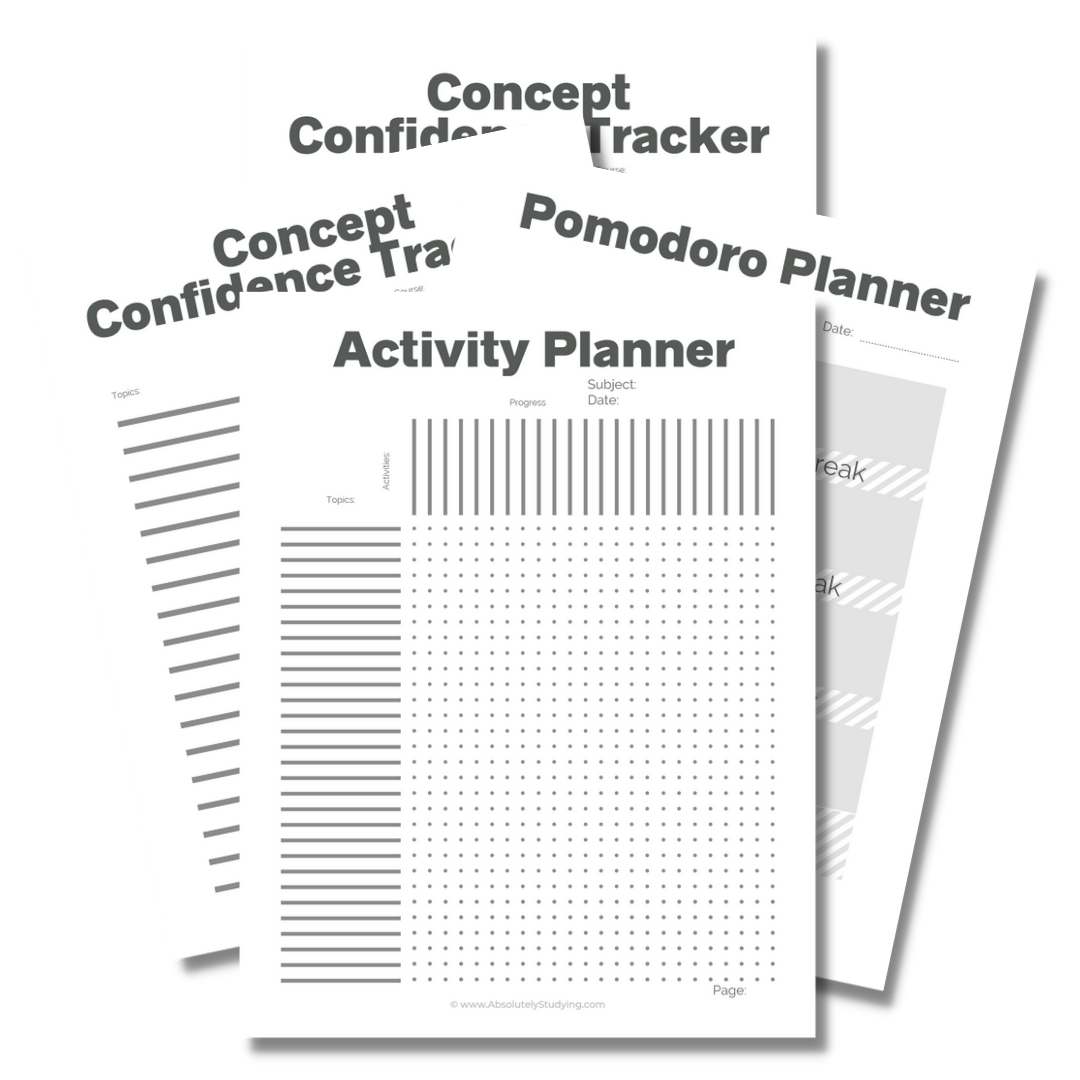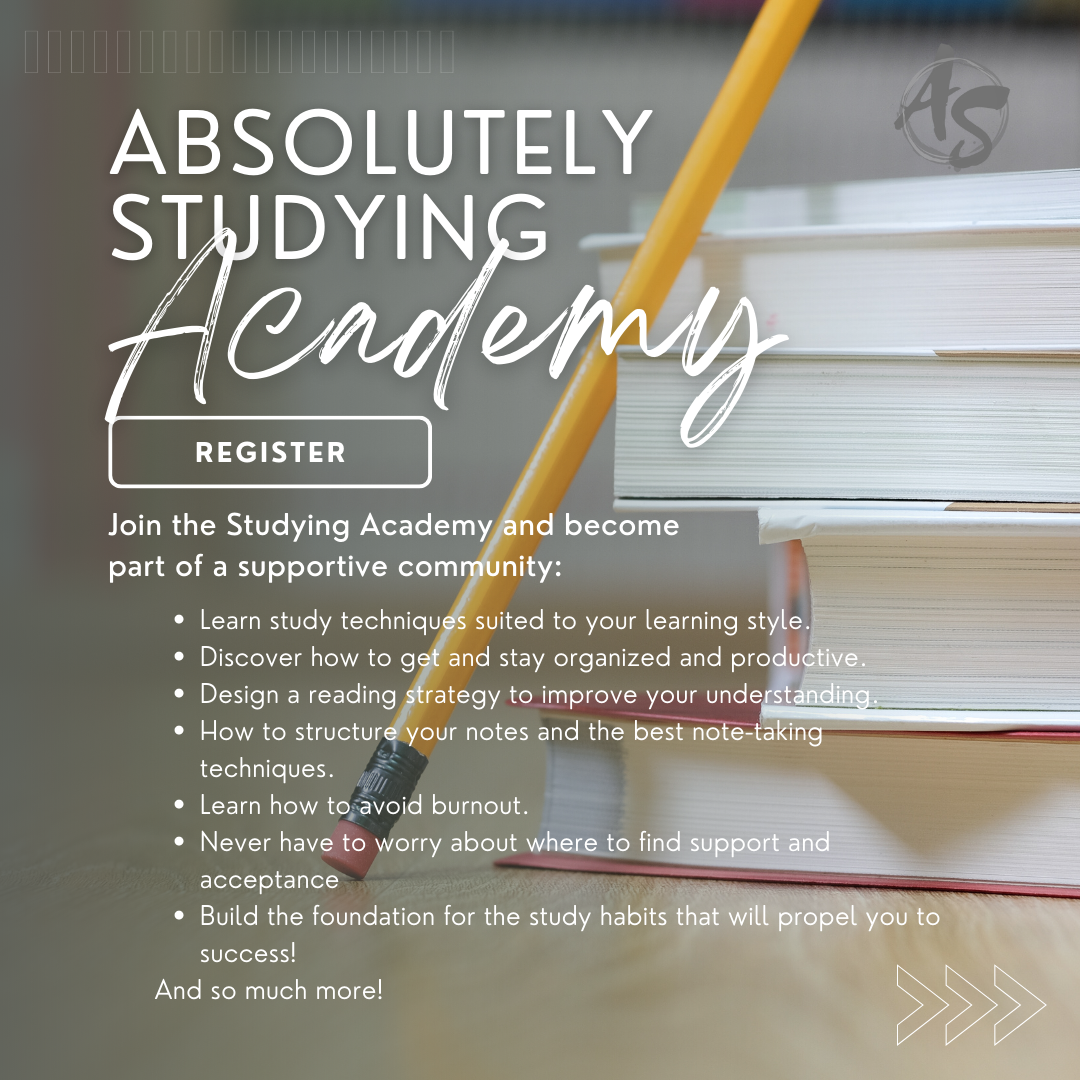Maximizing Your Study Guides for Exam Success!
Maximizing Your Study Guides for Exam Success.
How to actually create a study guide to ace that test.
Everything you need for the semester you want!
This bundle includes:
The Syllabus Study Planner
The Pomodoro Planner
A Confidence Tracker
A Q&A planner
The “Get Organized Checklist”
and more!
This workbook is full of super useful resources that can be applied to every aspect of your day.
* Disclaimer * Some of the posted links are affiliate programs. By clicking these links, I may receive monetary compensation. This will not alter the price or change the buyer's experience.
If you are familiar with me, you know that I am a massive advocate for study guides. But are study guides effective? Can they really make a significant impact on your study routine? That is what we are going to examine today.
Why are Study Guides Important?
Study guides can provide a massive boost to self-directed learning.
Self-directed learning is any time you are taking control of your own education. This is especially true during your study time.
Scientific studies have repeatedly shown that students who use study guides to supplement their learning perform better. This is true for exam scores as well as homework assignments.
Not only has it been proven that they are handy in boosting exam scores, but they are also helpful in increasing motivation to study.
I think it is because you don’t just read the same part of your textbook and write out notes. Or rewriting out notes over and over again.
This gets boring after a while. Really boring. Textbooks are often really dry reads. They are boring and technical. If you are not particularly interested in the actual information you are learning, the task will be tedious.
I often suggest splitting up your study period using the Pomodoro Technique. This involves studying for 25-minute intervals with 5-minute breaks in between. At the end of the fourth session, you take a 20-minute break. The entire session lasts about 2 hours, after which you will start over.
This technique is beneficial because it breaks up the workload with plenty of rest. You can focus intensely for the 25-minute blocks and then do something fun or get up and move around on your breaks. This technique is often helpful in boosting motivation and alleviating study fatigue. However, if you are only reading and writing notes every single study session, it will still get tiresome.
It is nice to be able to break up study sessions and do various activities. Not only does it give you a break from the boring, but it also helps you to take in the information in many different ways.
DOWNLOAD NOW: FREE STUDY PLANNER & ACTIVITY TRACKER
Free Study Guide Template
Download Your Free Study Planner and Activity Tracker Today.
Learning and using the information you are trying to learn differently creates mental associations. These will help you to deepen your understanding of the concepts under study. Creating mental associations is like building a web to the information. The more links you have to a fact or idea, the more opportunities you have to retrieve that piece of information when you need to during test time.
Usually, when you are using or creating study guides, it's a bit of a reprieve. You get to do something different. There are many kinds of study guides, depending on how you want to organize the information you are working with. Switching up and creating new ones will continuously develop new mental associations to make more intricate webs.
It also gives you the opportunity to do something a little more exciting, like drawing diagrams or plotting out information in a chart. Using colours, graphs, charts, or combinations of several other elements allows you to use and apply the knowledge you are trying to learn.
You are also using the information in novel ways that will help you to remember it. Trying to make a comprehensive chart between two topics will make you think very analytically about the information you are working with. And that will lead to a new level of understanding.
It has been discovered that study guides help to increase textbook comprehension. As I mentioned before, textbooks are dry. They are boring and technical, and they do not make a fun read. It is no wonder that students don't learn very efficiently by simply reading them.
Textbooks are critical because they allow students to learn the information at an extremely detailed level. One that educators are not able to describe during class time. Because of this, they are a necessity. It is often nearly impossible to get excellent grades without incorporating them into your study routine.
The problem is that reading your textbook is not always the most efficient way to learn the information. Most students have to actually work with the concept to fully understand it. Reading your text doesn't promote that unless you are also solving the chapter problems.
Extracting information from the textbook and using it to create a study guide will significantly boost your study session's efficacy. That is because you are now actually working with the information. Analyzing it and finding other data to compare and contrast or linking it with subtopics etc.
Study guides are like a tutor available to the student 24 hours a day. Tutors help you to break down and understand information better. That is precisely what a study guide does. However, these gems are available to you all the time. They are never off the clock or unavailable. They also don't charge hourly.
How Do Study Guides Help Students?
Study guides help you out in 3 ways:
Manage what you are learning, your learning time, and how you take in information.
Help you focus on a specific concept.
Supply information on the subject.
Manage what you are learning, your learning time, and how you take in information.
This is a vast umbrella. Basically, how this works is that study guides deliver the information to you in an organized manner. They are different from your notes, where you sift through the days' lectures for the topic you are looking for.
Each study guide is constructed around a single concept. It is then elaborated on and examined. As you create or review the study guide, you are focusing in-depth on that one concept. In this way, it is managing what you are learning and your learning time.
The style of the study guide, or how you are constructing it, will dictate how you are taking in the information. Depending on if you are making your study guide or reviewing it, you will be using different methods and senses to work with the data.
You will approach reviewing a colourful diagram differently than how you would tackle a mind map of flashcards. The more different types of study guide you make on a topic, the more ways you can review it, deepening your understanding.
Some students might benefit from the study guide's structured format, especially if they are easily distracted or bored.
Have you ever been reading your textbook and realized you forgot to pay attention to the words? Suddenly, you are halfway down the page, and you have no memory of what you were reading?
Study guides are structured, so this is less likely to happen. They are also more engaging and require more interaction to review. You are less likely to go on autopilot and realize that you were not interacting with the information.
Help you focus on a specific concept.
Study guides are meant to dive deep into a subject. This allows you to understand it on many different layers. Deepening your understanding of a topic will help you remember it clearly and work with the concept better.
When you use a study guide, you are really digging deep to understand that one concept before you move on. They are constructed for a specific topic. There is no extraneous information lying around to distract you or take you off-topic. In that way, it focuses your learning so that you can concentrate.
When you are reviewing notes or reading a textbook, information flows from one concept into the next. Study guides slow this down and explore one concept on its own.
It may discuss how other topics relate to or enforce the one under consideration. However, it will not trail off into that different topic until you put this study guide down and move on to another. In this way, it will keep you focused on this one theory or concept until your study session is over.
Provide information on the subject.
Effective study guides dive into the details of a concept. You are working with detail and facts. You are manipulating the idea to make sure that you understand it better.
Your study guide has to collect and present information to do this. An example of this is a visual study guide like a diagram. It is not as simple as a picture of a neuron. As you can see in the image, this neuron is labelled.
Would this be a study guide? Unfortunately, no. But it is a study guide in the making. We would want to further elaborate on this doodle to make it a full-fledged study guide.
Even though the landmarks are labelled, you would want to elaborate on them.
What does each of them do?
How do they do it?
What are they made of?
What is the function of this cell?
How does it perform its function?
How is each of these landmarks involved in its function?
Do you see how you can get quite detailed? The deeper you go in, and the more precise your study guide is, the more effective it will be for your study session.
A simple note-taking may be too passive of an activity for many students to truly study effectively. This may seem counterintuitive because that is literally how you are learning in your classes all day. The professor lectures and you frantically take notes.
Then, you go home and read your textbook and desperately take notes. This is what our entire education system is based on. And now here I am telling you that it is not effective?
This actually works on a sliding scale. Taking notes is more effective than simply listening, but interacting and working with the information you need to remember is much more effective than combined. This circles back to mental associations and how they help to create the intricate web for recall. The more paths you make to the information, the easier it will be for you to find it during exam time.
Another great point that these studies have found is that study guides are just as effective if the teachers distribute them or if the student makes them themselves.
Even if the teacher does not distribute a study guide, you can make one yourself. It will be even more effective because you are taking the time to create it yourself. You have to use and review the information in making it a study session and study activity.
How to make effective study guides
How to make a study guide:
Decide what your study guide covers, and then design the layout.
Is it for a test or an exam?
Will it cover the entire course?
Research and collect all of the information relevant to the concept you want the study guide to focus on.
This includes collecting data on all related topics that lead into it as well.
Answer who, what, why, when, and how.
Create a list that includes each topic you want to study
Create the study guide
Check out this article on how to create different types of study guides. It breaks down several different types of study guides and why they are useful.
Join the Absolutely Studying Academy for Ultimate Exam Success
Maximizing your study guides is a key strategy for exam success, but having the right resources and support can make all the difference. That’s where the Absolutely Studying Academy comes in. Our academy offers a wealth of resources, expert guidance, and a supportive community to help you create effective study guides and master your exam preparation.
What’s Included in the Academy:
Comprehensive Study Skills Courses: Access courses designed to enhance your study techniques, time management, and organizational skills, specifically focusing on creating and utilizing study guides.
Interactive Learning Modules: Engage with interactive modules that delve into various study strategies, including how to create different types of study guides and use them effectively.
Goal Setting and Achievement: Learn how to set realistic academic goals and develop actionable plans to achieve them.
Community Support: Join a community of like-minded students who share your academic journey. Participate in forums, group study sessions, and peer support activities.
Why Choose Absolutely Studying Academy?
The Absolutely Studying Academy is more than just a collection of courses. It's a comprehensive support system designed to help you excel in your studies while maintaining your mental and emotional well-being. Each course and resource is crafted to provide you with practical, actionable strategies that can be implemented immediately.
Understanding how to create and maximize study guides is crucial for academic success. Our academy helps you integrate effective study practices into your daily routine, ensuring you stay motivated, focused, and balanced. Whether you're struggling with time management, stress, or study techniques, our academy has everything you need to succeed.
Invest in your academic success and well-being by joining the Absolutely Studying Academy. Gain access to a wealth of resources, expert guidance, and a supportive community that will help you achieve your goals and maintain a healthy balance.
Take control of your academic journey and unlock your full potential with the Absolutely Studying Academy. Embrace the benefits of effective study strategies and excel in your exams with our comprehensive support system.
The Absolutely Studying Academy
Join our Study and Accountability Community!
I hope that this guide has inspired you to breathe new life into your study session. They don't have to be boring snoozefests; they can be exciting, fun, and even a creative outlet. Find a way to incorporate something you love doing into your study sessions.
If you love to draw, diagrams are a fantastic choice. If you are more kinetic, maybe you might want to create experiments or a 3-D model. There are literally limitless possibilities for crafting study guides for the information you need to learn.
Pick up our Study planner. It has more than 20 activities that you can turn into study guides, so you never run out of ideas. Use these activities as study guide templates during your next revision session.
I would like to be transparent so that there are no misunderstandings. As an affiliate, I may earn a small commission from any products linked in this post. This is not a sponsored post, and I was not asked to recommend these products. These are products that I genuinely love and want to share with my audience.








